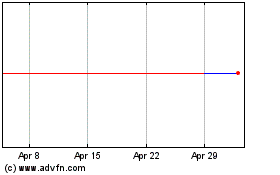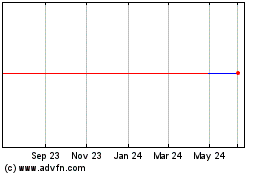The Truck Industry Bets On the Other Electric Vehicle
April 22 2020 - 5:46AM
Dow Jones News
By Stephen Wilmot
The truck industry is starting to take the other kind of
electric vehicle more seriously.
Daimler and Volvo, the world's two largest makers of heavy
trucks by revenues, said Tuesday they would team up to develop fuel
cells. Germany-based Daimler, which makes Mercedes-Benz cars as
well as Freightliner trucks, is carving out all its fuel-cell
activities, including those once intended for Mercedes, into a new
unit in which Sweden's Volvo will purchase a 50% stake for roughly
EUR600 million ($652 million). The companies will each plow at
least EUR100 million into the project.
There are two types of electric vehicle. Those powered by
smartphone-style lithium-ion batteries, such as Tesla's, are now
the primary technological focus of manufacturers of cars, vans and
light trucks. Those that use stored hydrogen together with fuel
cells to power the electric motor, though, is increasingly seen as
the technology most likely to help the road-haulage industry cut
greenhouse-gas emissions.
That is because lithium-ion batteries aren't powerful enough to
carry heavy trucks very far before needing a lengthy recharge.
Hydrogen tanks can simply be topped up like today's gas tanks. This
is one of the disadvantages of fuel-cell electric vehicles, too:
They have always been held back by the absence of refueling
infrastructure, as well as the expense of producing clean hydrogen
made using renewable electricity.
Volvo is betting at least EUR700 million that this will change.
Chief Executive Martin Lundstedt quipped on a call with media that
for most of his 30-year career fuel-cell vehicles had been 10 years
away. In 2008 Volvo spun a previous fuel-cell venture off as an
independent company, PowerCell Sweden. Now, though, Mr. Lundstedt
expects deployment in the late 2020s.
The new time frame has much to do with European rules introduced
last year that will force truck manufacturers to reduce the
emissions of their fleets substantially by 2030. If regulation
makes everyone move, affordable infrastructure is more likely to
emerge -- whatever the incentives created by more volatile factors
such as oil prices.
The deal isn't such a ringing endorsement of fuel-cell
technology for Daimler, which is essentially selling half its
business to Volvo. But the German automotive giant has reasons of
its own, being in the midst of a far-reaching operational overhaul
following a string of profit warnings last year. The current
Covid-19 crisis, which compounds an already dire outlook for truck
demand, piles more pressure on even the largest manufacturers to
share mounting product-development costs.
Stocks related to this technological niche have had a riotous
time on markets lately. PowerCell Sweden, now backed by components
giant Bosch, is up 345% over 12 months. Soon there will be a
pure-play electric-truck stock, too: Nikola Motor Company. This
startup, which has also received funding from Bosch as well as
Fiat's truck-making spinoff CNH Industrial, is applying Tesla's
playbook to heavy trucks and has plans to launch a fuel-cell
product in 2023. It is going public this quarter via a merger with
a Nasdaq-listed shell company, VectoIQ Acquisition Corp.
The truck industry's road to a greener future is a long one, but
it is already revving up for radical change. Investors need to
follow suit.
Write to Stephen Wilmot at stephen.wilmot@wsj.com
(END) Dow Jones Newswires
April 22, 2020 05:31 ET (09:31 GMT)
Copyright (c) 2020 Dow Jones & Company, Inc.
Mercedes Benz (PK) (USOTC:DMLRY)
Historical Stock Chart
From Mar 2024 to Apr 2024

Mercedes Benz (PK) (USOTC:DMLRY)
Historical Stock Chart
From Apr 2023 to Apr 2024
